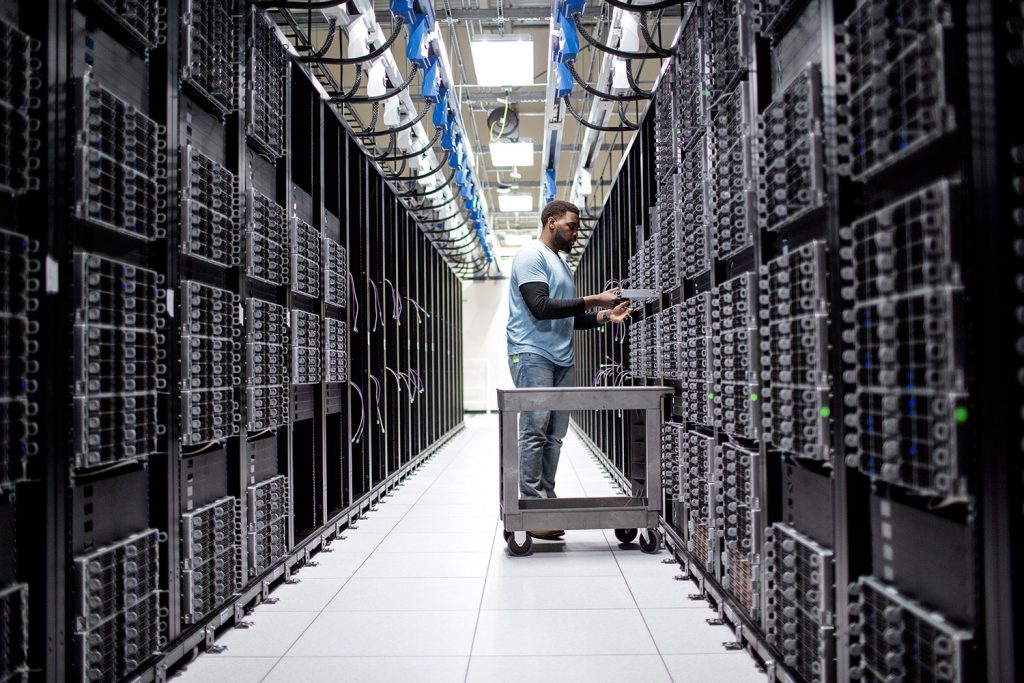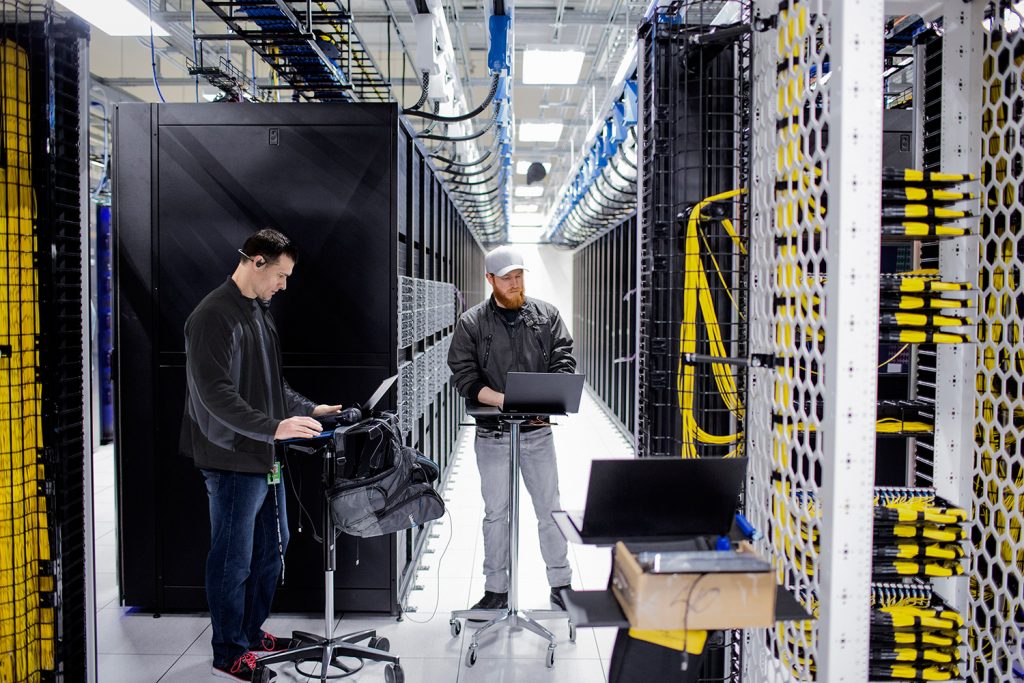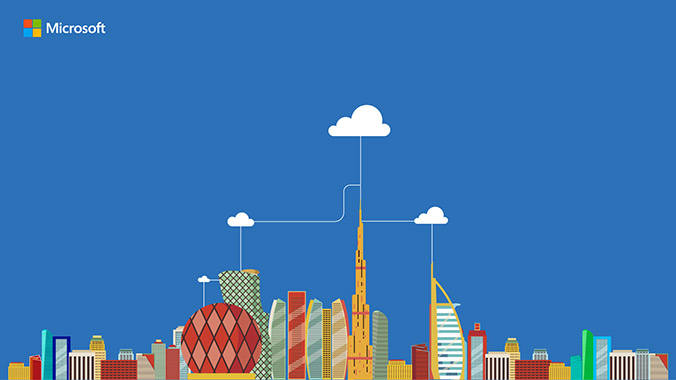Dubai, United Arab Emirates, March 14, 2018 – Microsoft today revealed plans to deliver the intelligent, trusted Microsoft Cloud from its first datacenters located in the Middle East, empowering organizations, governments, and businesses to achieve more and recognizing the unprecedented opportunity for digital transformation in the region.
The Microsoft Cloud, comprising Azure, Office 365 and Dynamics 365, will offer enterprise-grade reliability and performance, combined with data residency, from datacenters located in Abu Dhabi and Dubai with initial availability expected in 2019. Microsoft’s deep expertise in data protection, security and privacy, including the broadest set of compliance certifications in the industry, means customers in the region can accelerate their digital transformation knowing they have a trusted partner. Each new datacenter will adhere to Microsoft’s trusted cloud principles and becomes part of one of the largest cloud infrastructures in the world, already serving more than a billion customers and 20 million businesses.
“Today’s announcement marks the second datacentre expansion for Microsoft in the Middle East and Africa in less than a year,” says Samer Abu-Ltaif, President of Microsoft Middle East Africa. “The Microsoft datacentres in South Africa, together with this expansion in the UAE, highlight our ongoing commitment to the region, where we have invested for more than twenty years. We see enormous opportunity in MEA for cloud technology to be the key driver of economic development, as well as provide sustainable solutions to many pressing issues such as youth employability, education and healthcare. We will continue to work with governments and organizations across the region to accelerate their digital transformation, and I am excited about the role that our new datacentres will play in this transformation.”

Etisalat Digital, a business unit of Etisalat, is collaborating closely with Microsoft as a Cloud Solutions Provider, offering integrated connectivity with Microsoft ExpressRoute as well as private cloud services using Azure Stack. Etisalat is also providing consulting, migration and managed services to ensure the smooth transition of business customers to the cloud and sees tremendous potential from Microsoft’s intelligent cloud served from state-of-the-art datacenters. Salvador Anglada, Chief Business Officer, Etisalat says, “This alliance reinforces the UAE 2021 vision to become one of the top knowledge-based economies in the world. Our collaboration with Microsoft perfectly fits our existing capabilities and positions Etisalat Digital as the leading partner for our customers’ digital transformation journey. The strength of Microsoft’s cloud combined with Etisalat’s own advanced infrastructure and reliable connectivity will be instrumental in accelerating cloud adoption in the UAE and the Middle East.”
Microsoft works closely with technology partners throughout the Middle East and Africa, facilitating training and increasing employability across many sectors. Approximately 4,000 start-ups have been supported through programs like the Microsoft Virtual Academy, and Microsoft’s Cloud Society initiative is helping people in the region build marketable skills, readying them for the digital jobs of the future. The integration of the Abu Dhabi and Dubai datacenters with Microsoft’s global cloud infrastructure will connect regional businesses with global opportunities, help accelerate new investments and job opportunities and improve access to cloud services for people and organisations across the Middle East.

Microsoft’s network of 17,800 partners across the region, has recently been bolstered by the new Cloud Solutions Provider program, creating a platform for partners to deliver Microsoft’s cloud solutions locally.
Governments, large organizations, Small and Medium Enterprises (SMEs), as well as start-ups across all industries in the Gulf are making the most out of Microsoft’s cloud solutions, engaging customers, empowering employees, optimizing operations, and transforming their products and services. The Emirates Group, Emaar Properties, Etihad Airways, Majid Al Futtaim, Jumeirah Hotels and Resorts, Landmark Group, Daman Insurance, RAK Ceramics, Imdaad, Gulf Air, Ooredoo, Viva, Kuwait Finance House and Dubai World Trade Center are few of the numerous leading organizations that have chosen the trusted Microsoft Cloud as part of their digital transformation journey, empowering them to evolve their business end-to-end and achieve more.
“Microsoft has been present in the Middle East for more than two decades and is deeply invested in the region in many ways,” says Sayed Hashish, Regional General Manager, Microsoft Gulf. “Driven by strong customer demand for cloud computing, local datacenters were the logical next step given the enormous opportunity that the cloud presents. In areas like digital transformation, and the development of new intelligent services, our ambition is for the Microsoft Cloud to form a strategic part of the backbone for regional economic development.”

Microsoft has been rapidly expanding its cloud infrastructure to meet intensifying customer demand. Today the company also announced new cloud regions coming to Switzerland, the expansion of cloud options for customers in Germany, and the general availability of Azure and Office 365 from new cloud regions in France.
Over the last three years, Microsoft has more than doubled the number of Azure regions available. Today, Azure has more regions than any other cloud provider and has announced 50 regions across the globe which includes plans for 12 new regions.
Office 365 and Dynamics 365 also continue to expand the data residency options for customers with 17 geographies announced, and are the only productivity and business application platforms that can offer in-geography data residency across such a broad set of locations. Each geography delivers a consistent experience, backed by robust policies, controls, and systems to keep data safe, and helps provide greater choice to meet customer preferences and local requirements.





